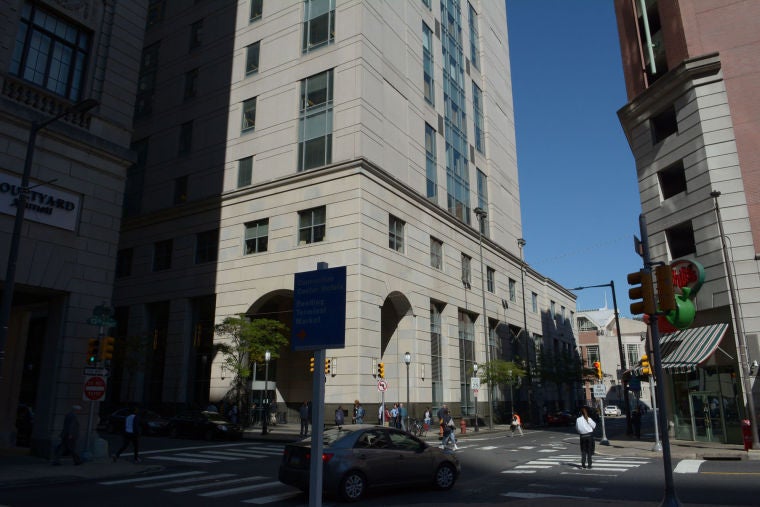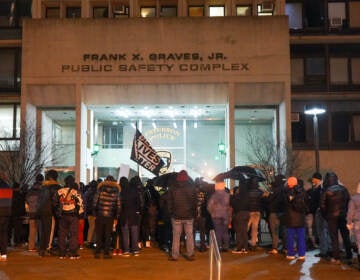Report finds ‘culture of nepotism,’ ‘troubling pattern of racial resentment’ brewing in city courts
The report found that women of color, including female judges, were “experiencing specific harm” working within the district’s organizational culture and structure.

A file photo of the Juanita Kidd Stout Center for Criminal Justice. (Tribune Photo/Abdul R. Sulayman)
This story originally appeared in The Philadelphia Tribune.
___
A scathing report found a “culture of nepotism, mistrust and racial tension constantly brewing” at the city’s courts and a “troubling pattern of racial resentment.”
The Center for Urban and Racial Equity (CURE), an independent organization, conducted the equity organizational assessment of the First Judicial District of Pennsylvania’s culture and structure last year.
CURE surveyed hundreds of staff, judges and leadership. The First Judicial District’s (FJD) Administrative Governing Board, which selected CURE to conduct the survey in December 2018, received the report in July 2019 but did not make it public until last week.
The report found that women of color, including female judges, were “experiencing specific harm” working within the district’s organizational culture and structure, and found they “perceive less organizational commitment to equity than other groups.”
Among some white staff and judges, the report found a “troubling pattern of racial resentment,” which was “often expressed as a disbelief that institutional and structural racism exists and belief that reverse racism is as significant as racism against people of color.”
The report noted one white judge who said, “Black coalitions seem to now rule.” And a white employee said, “[a]s far as ‘ethnicity,’ in my life experience, he who cries ‘racism’ is usually steeped in racism.”
A spokesperson for the courts directed all questions to Martin O’Rourke, a media consultant who also was a spokesman for Mayor Jim Kenney’s reelection campaign last year.
In a released statement, O’Rourke said the governing board initiated the analysis to support equity, inclusion and diversity in the courts. Court leadership has shared the report with all employees.
“Their ongoing participation and willingness to share their experiences will guide internal dialogue and move us forward in a direction that gives equity, inclusion and diversity our full attention and support,” O’Rourke said.
O’Rourke declined to answer any additional questions, including why the report was not released for a year.
But in an email O’Rourke provided that was sent to staff, the governing board said it released the report this month due to recent events, possibly a reference to the protests around the police killing of George Floyd in Minneapolis.
“As a result, in an attempt to uphold the mission, vision, and values of the First Judicial District, we must acknowledge and recognize the systemic problems within our courts,” the governing board said in the email.
The Barristers’ Association of Philadelphia and the Clifford Scott Green Chapter of the National Bar Association Judicial Council slammed the findings in a joint statement.
David Williams, president of the local chapter of the Barristers’ Association, commended the governing board for publicly releasing the report but said the real work to correct the issues in the court now begins.
“The first step is to acknowledge you have a problem,” Williams said. “Now comes the real work: rooting out the documented, deep-seeded nepotism and racial bias that undermines the FJD as an effective organization and erodes public confidence in the effective administration of justice.”
FindingsNepotism was a “characteristic of FJD’s culture” and a “major hindrance to equity,” the report found.
Black staff members who were surveyed reported not being promoted, not receiving recommendations for promotions, and having to fight for menial increases to salary, according to the report.
“These tensions are causing additional stress on staff of color who spoke about not only having to do their jobs, but also serve as a support system to each other — acting as ‘psychiatrists’ on top of everything else,” the report found.
Judges and administrative leadership, the report said, are “deeply aware” of the presence of nepotism but were “either unwilling to change it or do not believe they have the capacity to challenge it.”
While the survey found that staff rated court leadership moderately in its commitment to treating employees respectfully, ratings noticeably declined in areas related to leadership’s support for equity-related conversations.
“A lack of support for these conversations in a court system where there have been widely known incidents of racism can foster a culture of implicit and explicit bias and brand marginalized people expressing these concerns as troublemakers rather than whistleblowers,” according to the report.
The report found both judges and staff expressed “hesitancy that FJD would do the right thing in response to concerns about discrimination in the workplace.”
And staff also expressed “fear and mistrust” with human resources and leadership. The mistrust even stretched to staff questioning the report, with many expressing the belief that the survey was designed to protect the district from culpability.
Judges, however, generally had a more optimistic view of the district’s culture and commitment to equity and inclusion, the report found.
Staff at the district generally did not find training in equity, diversity and inclusion helpful and most (51%) haven’t even received the training.
In contrast, most judges (61%) received equity, diversity and inclusion training and 51% found it helpful.
The report also found positives. Staff and judges reported that they work with a “culturally diverse staff and feel respected in the workplace,” and believe that the court’s policies “promote fairness” and that they regularly experience meaningful interactions with people from diverse backgrounds, among other things.
The survey included responses from 670 staff members, 45 judges, 7 members of executive management, and 7 members of leadership, and three focus groups, among others. The survey asked participants to rate issues on a 1- to 5-point scale.
Among staff, whites made up 51% of respondents, while people of color made up 49% overall, which Blacks making up the largest subgroup (32%). Females made up the majority of respondents at 62% and men 35%.
Among judges, 62% of respondents were white and 38% were people of color, with Blacks again making up the largest subgroup at 27%. Male judges made up the majority at 53% and female judges 47%.
Racist letter targeting judge ‘not taken seriously’The report faulted court leadership for mishandling a racist message targeting a Municipal Court judge two years ago.
In December 2018, Judge Karen Yvette Simmons, an African-American female judge, discovered the typewritten message in her robing room at the Criminal Justice Center days before her unsuccessful bid to become the first African-American Municipal Court president judge.
“There Will Never Be A Black B– — Running Our Court. You Won’t be President Judge!!! Keep MC Court Great!!” said the message found in December 2018.
The report faulted court leadership for its handling of Simmons’ case, saying the “racist letter was not taken seriously, and staff of color — particularly women of color — took note that the intersection of racism and sexism is not taken seriously by white employees throughout FJD.”
Simmons did not immediately return a call seeking comment on Monday.
The Philadelphia Police Department was investigating the incident. A spokesperson for the department did not respond to a request for comment seeking an update about the investigation.
Recommendations CURE made several recommendations to the First Judicial District.
Among them was an equity review of all salaries and promotions for racial equity and seniority.
In addition, CURE called for making internal salary ranges available to all staff and explicitly write in performance reviews why an employee is at his or her current salary.
“This will improve accountability when staff ask for salary increases and promotions, and provide FJD an opportunity to give people a realistic understanding of their movement and growth,” the report said.
CURE also recommended the court having a box for employees to anonymously deposit complaints and suggestions; allowing staff and residents to take part in the court’s development of criminal justice reform initiatives; and publishing the CURE report.
“Accountability is critical for organizations serving the public,” the report said, “and leadership of this institution should not solely belong to judges or administration, but to community members who are the primary recipients of its services.”
The Administrative Governing Board is currently organizing equity and inclusion training for employee and using the report to identify areas the courts can be more equitable, according to an email sent to court employees.
“This report may capture some of the issues in our system, but it also serves as a first step towards a more equitable FJD,” the governing board said in the email. “It’s now up to us to ensure progress is realized.”
Court of Common Pleas Judge Sierra Thomas Street, who is the chairwoman of the Judicial Council, said in the joint statement with the Barristers’ Association that “inept hiring practices” have led to “dangerous levels of complacent and a lack of accountability” in the courts.
“This status quo is unacceptable for an institution that is charged with serving the general public in a fair and equitable manner,” Street said. “Ignoring the problem is not an option. We must see tangible change and results.”
mdonofrio@phillytrib.com 215-893-5782

Get daily updates from WHYY News!
WHYY is your source for fact-based, in-depth journalism and information. As a nonprofit organization, we rely on financial support from readers like you. Please give today.





